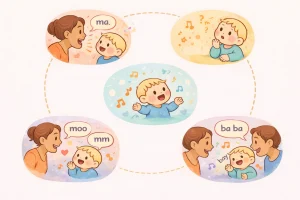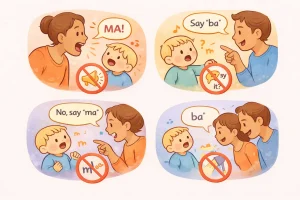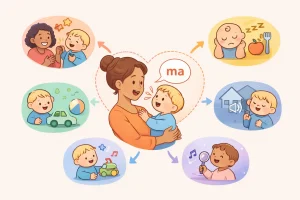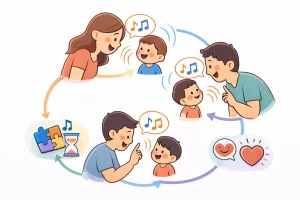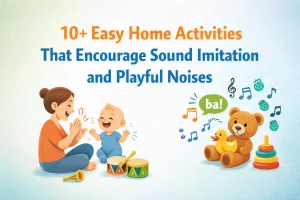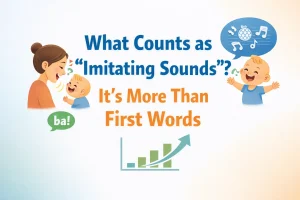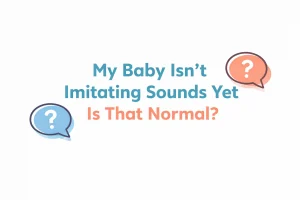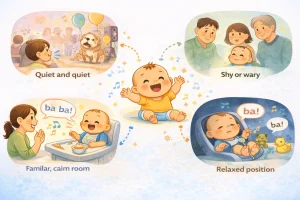Top Online Behavioral Therapy Techniques for Young Children
By Wellness Hub
Last Updated: August 7, 2024
Online behavioral therapy has become an increasingly popular approach to addressing behavioral challenges in young children. This method allows for convenient, accessible, and flexible treatment options that cater to each child’s unique needs. With the help of digital platforms, children can receive professional support from the comfort of their homes, making therapy more approachable for families.
Importance of Early Intervention:
Addressing behavioral issues early in a child’s life is crucial. Early intervention can significantly impact a child’s development, helping them build essential skills and overcome challenges before they become ingrained. By identifying and addressing issues early, parents can support their child’s emotional, social, and cognitive growth, leading to better long-term outcomes. Early intervention can prevent minor issues from escalating into more severe problems, making it a valuable step in a child’s development journey.
Also read: Early Identification/ Warning Signs in child development
Understanding Online Behavioral Therapy
What is Online Behavioral Therapy?
Online behavioral therapy is a form of psychological treatment delivered via digital platforms. It involves licensed therapists working with children and their families through video calls, chat sessions, or specialized apps. The focus is on addressing behavioral issues, improving emotional regulation, and developing coping strategies. This approach allows therapists to observe a child’s behavior in their natural environment and provide tailored interventions that align with the child’s unique needs.
Online behavioral therapy often incorporates techniques from various therapeutic disciplines, such as Cognitive Behavioral Therapy (CBT) and Applied Behavior Analysis (ABA). By using interactive tools and games, therapists can engage children in a fun and effective way, making the learning process enjoyable and less intimidating.
Also Read: Online Behavioral Therapy for Kids
Benefits of Online Therapy for Young Children
One of the most significant advantages of online therapy is its convenience. Families can access therapy sessions from the comfort of their homes, eliminating the need for travel and allowing for more consistent participation. This flexibility is especially beneficial for parents with busy schedules or those living in remote areas where in-person therapy options may be limited.
Another key benefit is the accessibility of online therapy. It opens up opportunities for children to receive high-quality care from specialists who may not be available locally. This is particularly important for specialized therapies, like those for behavioral issues, where finding a qualified therapist nearby can be challenging.
Moreover, online therapy provides a unique advantage in terms of environmental familiarity. Children are often more relaxed and open in their own homes, which can lead to more authentic interactions and observations. This familiarity can help therapists better understand the child’s behavior and design more effective interventions.
Know more: How Behavioral Therapy Helps Kids with ADHD
Key Techniques in Online Behavioral Therapy
A. Cognitive Behavioral Techniques
Cognitive Behavioral Therapy (CBT) is a widely used approach in child psychology that focuses on changing negative thought patterns and behaviors. For children, CBT helps them understand the connection between their thoughts, feelings, and actions. This form of therapy is particularly effective in helping young children manage anxiety, depression, and behavioral issues by teaching them practical skills to handle difficult situations.
Examples:
- Identifying and Challenging Negative Thoughts: Therapists work with children to identify unhelpful thoughts that lead to negative feelings and behaviors. For example, if a child feels upset about a mistake, the therapist helps them reframe the thought into something more positive, like understanding that everyone makes mistakes.
- Behavior Modification Strategies: These involve reinforcing positive behaviors and reducing negative ones. Techniques such as setting achievable goals and using rewards can encourage children to practice desired behaviors consistently.
Also read: Understanding Behavioral Therapy: A Simple Guide for Parents
B. Applied Behavior Analysis (ABA)
Applied Behavior Analysis (ABA) is a therapeutic approach that focuses on improving specific behaviors, such as social skills, communication, and learning skills, through positive reinforcement. ABA is commonly used for children with autism spectrum disorder but is also effective for other behavioral issues.
Techniques:
- Positive Reinforcement: This involves rewarding a child when they display a desired behavior, which increases the likelihood of that behavior being repeated. Rewards can range from verbal praise to small tokens or activities the child enjoys.
- Discrete Trial Training (DTT): This method involves breaking down skills into small, manageable steps and teaching each step one at a time. It’s a structured way to teach complex skills by focusing on simple, easily understood tasks.
C. Play Therapy Techniques
Play therapy uses play as a medium to help children express their emotions, thoughts, and behaviors. It is a natural way for children to communicate, making it an effective tool in therapy, especially when adapted for online settings.
Techniques:
- Using Games and Activities: Therapists incorporate games and creative activities to engage children in therapy. These activities can help children explore their feelings, develop problem-solving skills, and build social skills. For example, a therapist might use an online drawing game to help a child express their emotions.
D. Social Skills Training
Developing social skills is crucial for young children as they learn to interact with others. Social skills training helps children understand social cues, communicate effectively, and build positive relationships with peers and adults.
Techniques:
- Role-Playing: This involves practicing social scenarios with the therapist, allowing children to learn and practice appropriate responses in a safe environment.
- Social Stories: These are short, simple stories that describe social situations and appropriate responses. They help children understand how to behave in various social settings, such as greeting someone or taking turns.
E. Parent Involvement and Coaching
Parents play a vital role in online therapy sessions, as they can reinforce the therapeutic techniques learned during sessions at home. Parent involvement ensures that therapy is consistent and extends beyond scheduled sessions.
Techniques:
- Training Parents: Therapists provide parents with strategies and tools to support their child’s progress. This may include teaching parents how to use positive reinforcement, manage challenging behaviors, and create a supportive home environment.
- Home Practice: Parents are encouraged to practice therapy techniques with their children outside of sessions, reinforcing what has been learned and helping to generalize skills to everyday life.
Tools and Platforms for Online Therapy
Technology in Online Therapy
In online behavioral therapy, technology is key to connecting therapists with young children. Various tools and platforms are used to make therapy sessions engaging and effective. These technologies help with communication and add interactive elements that make the experience enjoyable for children.
Video Conferencing
Video conferencing is one of the most common tools in online therapy. Platforms like Tele-BASICS allow therapists and children to interact face-to-face in real time. This visual connection helps build rapport and allows therapists to see the child’s non-verbal cues and body language. It also offers flexible scheduling, making it easy for families to fit therapy sessions into their busy lives.
Therapeutic Apps
Many apps are specifically designed for therapy. They often include features like interactive games, emotion tracking, and guided exercises. For example, apps like BASICS – Social & Social Skills app provide mindfulness and relaxation activities, while others focus on skills like emotion regulation or social skills training. These apps give children a fun and practical way to practice therapy techniques outside of scheduled sessions.
Interactive Games and Tools
Interactive games and digital tools play a big role in online therapy. They make sessions more engaging, especially for children who respond well to playful and interactive methods. Therapists might use online drawing tools, virtual whiteboards, or special therapy games to teach skills like coping, social behavior, and emotional regulation. These tools are not only fun but also help children apply what they learn in therapy.
Specialized Platforms for Therapy
Some platforms are designed specifically for online therapy. They offer a range of tools tailored for therapy, like secure video conferencing, session recording, and progress tracking. These platforms may also include resources like worksheets, videos, and interactive activities. They ensure that therapy is secure and effective, providing a well-structured environment for both therapists and children.
Advantages and Challenges of Online Therapy
Advantages
Online therapy provides several benefits that make it a great option for families looking for support with their children’s behavioral issues.
- Accessibility:
Online therapy is accessible to families everywhere, including those in remote areas with limited access to specialized therapists. It allows children to receive expert care without geographical limitations. - Comfort of the Home Environment:
Children often feel more relaxed and comfortable at home, which can make therapy sessions more effective. Being in a familiar setting can reduce anxiety and help children open up more with their therapist. - Personalized Approaches:
Therapists can tailor online sessions to fit each child’s specific needs, adjusting their methods in real-time based on the child’s responses. This personalized care ensures that therapy addresses the child’s unique challenges and goals. - Convenience and Flexibility:
Scheduling online therapy is often easier than in-person appointments. Families can fit sessions into their busy lives without the hassle of commuting. This flexibility helps maintain consistency in therapy, which is important for progress.
Challenges
While online therapy has many benefits, there are also some challenges to consider.
- Technological Issues:
Online therapy relies on technology, and technical problems like poor internet connections or software glitches can interrupt sessions. It’s important for families to have reliable internet access and be comfortable using the technology. - Need for Parental Involvement:
Online therapy often requires more involvement from parents than in-person sessions. Parents may need to help set up the technology, manage the session environment, and reinforce therapy techniques at home. This can be demanding, especially for busy parents. - Limited Non-Verbal Communication:
Although video calls allow some non-verbal communication, they don’t capture all the nuances of in-person interactions. Therapists may miss subtle cues in body language or facial expressions, which are important for understanding a child’s emotions. - Engagement Challenges:
It can be challenging to keep young children engaged during online sessions. They might have trouble focusing on a screen for long periods, especially if they are used to more interactive, in-person sessions. Therapists need to use creative strategies to maintain the child’s interest and participation.
Tips for Maximizing the Effectiveness of Online Therapy
Creating a Suitable Environment
To make online therapy sessions effective, it’s important to set up a good environment at home. Find a quiet and comfortable space where your child feels safe and relaxed. Make sure this area is free from distractions like TV noise or interruptions from family members. Good lighting and a strong internet connection are also important for smooth sessions. Having a dedicated space for therapy signals to your child that it’s time to focus. Keep necessary items like a laptop or tablet, headphones, and any therapy materials ready to avoid interruptions.
Ensuring Consistency
Consistency is crucial for progress in online therapy. Regular sessions help reinforce the skills and strategies your child is learning, making it easier for them to apply these skills in daily life. Try to keep a regular schedule and avoid canceling or rescheduling sessions. Consistent attendance shows your child that therapy is important. Also, make sure to follow through with any “homework” or exercises given by the therapist, as these activities help reinforce learning outside of sessions.
Collaboration with Therapists
Successful online therapy requires good teamwork between parents and therapists. Parents can provide valuable insights into their child’s behavior and progress. Share any observations or concerns with the therapist to help tailor the therapy to your child’s needs. Being involved in the therapy process, whether by participating in sessions or helping your child practice skills at home, can greatly improve the outcomes. Therapists can also guide how to use therapeutic strategies in everyday life, making it easier for parents to support their child’s growth.
Conclusion
Online behavioral therapy provides a convenient and effective way for parents to support their child’s growth from home. With flexible sessions and personalized techniques like CBT and ABA, it fits seamlessly into busy schedules. By using interactive tools and creating a nurturing environment, parents can actively contribute to their child’s progress. While challenges like technical issues or the need for active involvement may arise, the benefits are well worth it. Ready to take the next step? Explore our services at Wellness Hub, where our experienced therapists are dedicated to supporting your child’s journey toward positive behavioral change.
Frequently Asked Questions:
1. What is online behavioral therapy for young children?
Online behavioral therapy involves using digital platforms to provide therapeutic services to young children. It helps address behavioral issues and emotional challenges through techniques like CBT and ABA.
2. How does online behavioral therapy work?
Therapists use video conferencing, apps, and interactive tools to conduct sessions. They work with children and parents to develop strategies for managing behavior and emotions.
3. What are the benefits of online behavioral therapy for kids?
Benefits include accessibility, convenience, the comfort of home, personalized care, and the ability to connect with specialized therapists regardless of location.
4. What techniques are used in online behavioral therapy?
Techniques include Cognitive Behavioral Therapy (CBT), Applied Behavior Analysis (ABA), play therapy, social skills training, and parent coaching.
5. Can online therapy be as effective as in-person therapy for children?
Yes, online therapy can be very effective, especially when sessions are regular and parents are involved. It provides a flexible and convenient option for many families.
6. What tools are commonly used in online behavioral therapy sessions?
Common tools include video conferencing platforms, therapeutic apps, interactive games, and digital whiteboards.
7. How can parents help maximize the effectiveness of online therapy?
Parents can create a quiet and comfortable therapy space, ensure consistency in sessions, and collaborate closely with therapists to support their child’s progress.
8. What challenges might arise with online therapy for kids?
Challenges can include technical issues, maintaining a child’s focus, and the need for active parental involvement.
9. How do I know if online behavioral therapy is right for my child?
Online therapy is suitable for many children, especially if in-person sessions are not accessible. Consulting with a professional therapist can help determine if it’s the right fit.
10. How can I prepare my child for their first online behavioral therapy session?
Explain to your child that they will be talking and playing with a friendly adult who is there to help them. Set up a quiet, comfortable area for the session without distractions. Make sure your computer or tablet is ready and working. You can also show your child a picture or video of the therapist to help them feel more comfortable. This will help your child feel relaxed and ready for their first session.
About Author:
Lasya Vooturi
Clinical Psychologist and Behavioral Therapist
Lasya holds a Professional Diploma in Clinical Psychology from Amity University, where she deepened her understanding of psychological principles from March 2023 to March 2024. With over a year of dedicated experience as a Behavioral Therapist, Lasya has honed her skills in applying effective therapy techniques tailored to individual needs. Fluent in Telugu, Hindi, and English, she is adept at connecting with a diverse range of clients, ensuring comprehensive communication and understanding. Lasya’s approach is grounded in empathy and scientific rigor, making her a trusted ally in navigating mental health challenges.
Book your Free Consultation Today
Parent/Caregiver Info:
Client’s Details:
* Error Message
